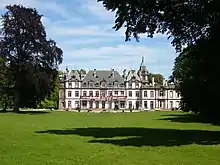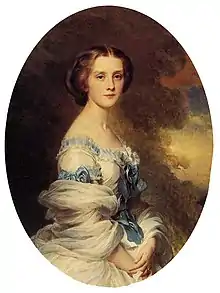Château de Pourtalès
Château de Pourtalès (or Château de Robertsau) is a château situated in the département of Bas-Rhin, Alsace, France. It's dated to the 18th century and named after the Pourtalès family.

History

The Château de Pourtalès was built around 1750 as a small manor house in the Robertsau neighborhood by Joseph Guérault, then contractor of the works of the king in charge of the construction of the fortifications of Strasbourg.[1] In 1802, Baron Paul-Athanase Renouard de Bussierre, who was from a wealthy industrial family from Strasbourg, bought the house and expanded the manor into a gracious Château. Between 1870 and 1914, the château was the residence of Comtesse Mélanie de Pourtalès (née de Bussière) and her husband, Count Edmond de Pourtalès (a son of the Swiss banker and art collector, Count James-Alexandre de Pourtalès).[2] Comtesse Mélanie, a renowned French salonnière and Lady-in-waiting to Empress Eugénie, was the only surviving child of Baron Alfred Renouard de Bussière, head of the Royal Mint of Paris.[3]
During the Franco-Prussian War of 1870, the château suffered fire damage. Prominent guests of the château included European aristocracy and members of the arts, including Albert Schweitzer, Franz Liszt, Napoléon III and his wife, the Empress Eugénie, the Princes of Belgium and Russia, Ludwig I of Bavaria, the Grand Duke of Baden and the Princess Metternich.[4]
After Comtesse Mélanie's death in 1914, the château was inherited by her youngest daughter, Agnès de Pourtalès, who was married to Henri, Marquis de Löys-Chandieu (who had been engaged to Victoria Sackville-West before her marriage to Baron Sackville).[5][6]
During World War I, it was occupied by the Germans, and later liberated by the Americans. The owners of the château in 1939 closed the property and during World War II, it was confiscated by the Germans and used to house high-ranking officers before it was occupied by Allied Forces for a short period following the war. After the War, it was the site an Eastern European University for a short time,[7] but was closed again following the construction of the Berlin Wall.[2]
In 1972, the nearly falling down château was bought by Dr. Walter Leibrecht, the founder of Schiller International University, to house students of the University. For more than 25 years, Schiller's students resided in the château.[8]
Hotel Château de Pourtalès
In 2009, the Château de Pourtalès was converted to a hotel and has housed many Members of the European Parliament during the session.[2][9]
References
- Pfister, Robert (1984). Métamorphose d'un village: la Robertsau de 1900 à nos jours (in French). Editions de la Tour Blanche. p. 122. ISBN 978-2-86587-000-4. Retrieved 14 May 2020.
- "The history of the Château de Pourtalès". www.chateau-pourtales.eu. Château de Pourtalès. Retrieved 14 May 2020.
- Flandreau, Marc; Flandreau, Professor of Economics Marc (2004). Or Du Monde. OUP Oxford. p. 136. ISBN 978-0-19-925786-7. Retrieved 10 May 2020.
- "The History of the Château de Pourtalès". studyabroad-france.eu. European Study Center in Strasbourg, France. Retrieved 10 May 2020.
- Sackville-West, Robert (2015). The Disinherited: A Story of Family, Love and Betrayal. Bloomsbury Publishing USA. p. 110. ISBN 978-1-63286-043-9. Retrieved 10 May 2020.
- Pinçon, Michel; Pinçon, Monique (1999). Grand Fortunes: Dynasties of Wealth in France. Algora Publishing. p. 135. ISBN 978-1-892941-18-3. Retrieved 10 May 2020.
- Higher Education. Higher Education Division, United States Office of Education, Federal Security Agency. 1952. p. 188. Retrieved 14 May 2020.
- "A real-life mystery: The haunting of Château de Pourtalès". The Norwegian American. 30 March 2015. Retrieved 14 May 2020.
- Wells, Mike (2018). The Rhine Cycle Route: From source to sea through Switzerland, Germany and the Netherlands. Cicerone Press Limited. p. 168. ISBN 978-1-78362-631-1. Retrieved 14 May 2020.
External links
| Wikimedia Commons has media related to Château de Pourtalès. |